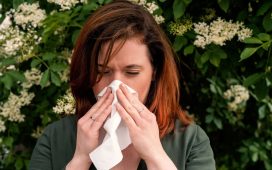
Lucy Diamond, registered dietitian and Clinical Director for Innovation at NHS weight management provider, Oviva
Like many others getting slimmer, more toned and beach ready might be your short-term goal this summer.
But losing a few pounds shouldn’t be about ‘quick fixes or extreme, fad diets,’ warns Lucy Diamond, registered dietitian and Clinical Director for Innovation at NHS weight management provider, Oviva.
Maintaining a healthy weight isn’t just important for aesthetic reasons it also booths your overall well-being and can help prevent numerous health conditions, including heart disease, type 2 diabetes, and certain cancers.
Cutting out refined sugar and staying away from greasy fast-food is one of the more obvious ways to help you lose a few pounds.
However, making other food swaps to create fibre and protein rich meals will also help you make your weight loss goals more manageable, says Ms Diamond.
Cut down on calories but keep it nutrient dense…
Eating a balanced diet with plenty of fruit, veggies and protein rich food will help you reach your weight loss goals.
But you need to make sure you are keeping an eye on how many calories you eat overall compared to your calorie output.
That’s because a ‘calorie deficit’, when you consume fewer calories than your body needs to maintain its current weight, is vital to shedding a few pounds.
‘This is achieved by either reducing calorie intake through dietary changes, increasing physical activity, or a combination of both,’ Ms Diamond explains.

You need to make sure you are keeping an eye on how many calories you eat compared to your calorie output, dietitians say
When in a calorie deficit, your body starts to use the stored fat for energy, which results in weight loss.
But going too far into calorie restriction can result in health issues such as a decreased metabolism and nutritional deficiencies.
Ms Diamond says: ‘It’s important to approach a calorie deficit in a healthy and sustainable manner, ensuring you still consume sufficient nutrients to support overall health and well-being.
‘Extreme calorie restriction can lead to nutrient deficiencies, decreased metabolism, and other health issues, so it’s advisable to aim for a moderate deficit and incorporate a balanced diet and regular exercise into your routine.’
Instead of restricting food intake entirely, Ms Diamond recommends eating ‘nutrient-dense’ foods, which provide a high number of vitamins and minerals rather than ’empty calories’ such as sweets.
She says: ‘This doesn’t mean you have to count calories but approach it as maximising nutritional value of what you are eating, rather than empty calories.’
Sustainable food swaps are high in fibre and protein…
If in a calorie deficit it’s important to make sure you’re eating high fibre and high protein snacks rather than carb based foods, as this will keep you feeling ‘satisfied’ and fuller for longer, Ms Diamond says.
She suggests snacking on hardboiled eggs, apple slices with a small helping of nut butter, or some hummus and carrots.
For healthy meal options she suggests a quinoa salad with vegetables and chickpeas, a chicken and vegetable stir-fry, a lentil chili or grilled salmon with sweet potatoes and steamed broccoli.
Ms Diamond says: ‘These foods not only provide important nutrients, but also help in maintaining satiety and reducing cravings for unhealthy snacks.’
But if trying to lose weight it’s important to keep portion sizes and plate composition in mind, Ms Diamond warns.
To make sure you’re not being too generous she recommends sticking to the ‘t-plate model’, which is where fill a quarter of your plate of carbohydrates, a quarter protein and half a plate of veg.
If you are craving something sweet, Ms Diamond advises to steer away from a cake or ice cream for dessert and instead opt for Greek yoghurt with berries.
Doing so will help you avoid sugary and processed foods, which can contribute to weight gain and an increased blood sugar, she says.

Snacking on hardboiled eggs, apple slices with a small helping of nut butter or some hummus and carrots will keep you feeling ‘satisfied’ and fuller for longer, Ms Diamond says
‘Choose whole, unprocessed foods whenever possible and read nutrition labels to be aware of hidden sugars and unhealthy additives,’ Ms Diamond says.
‘Minimise sugar and maximise fibre, this will help satiety. Feeling fuller for longer can help with weight loss and maintenance and curb sugar cravings.’
Staying hydrated also plays a significant role in weight management.
However, this doesn’t include sugar free squash, teas or coffees with a just a dash of milk — as these contain sugars, she warns.
‘Drinking water before meals can reduce hunger and prevent overeating. Additionally, water supports metabolism and the efficient functioning of the body’s systems,’ she added.
Put your phone down and avoid distractions…
Slowing down and paying full attention to what you are eating can also help you consume less.
Eating mindfully helps you to recognise physical hunger and fullness cues, according to Ms Diamond.
To do this, she suggests turning off the TV and putting down the smartphone at mealtimes to avoid mindless scrolling and, in turn, mindlessly eating.
She also urges people to chew slowly, savouring each bite, to both enhance enjoyment of the food and reduce overall intake.
‘Many people do not practice mindful eating, regardless of their weight, but mindful eating makes us more aware of how much we are eating and has the potential to transform your relationship with food,’ Ms Diamond says.

Turning off the TV and putting down the smartphone to avoid mindless scrolling can help stop overeating
Get your full eight hours a night….
Getting enough shut eye is also vital for maintaining a healthy weight.
That’s partly because a lack of sleep can disrupt the hormones that regulate hunger, leading to increased appetite and weight gain.
Similarly, chronic stress can lead to emotional eating and unhealthy food choices.
Everyone has different needs but, Ms Diamond advises most of us to aim for 7-9 hours of sleep per night.
She also suggests people incorporate stress-reducing practices such as meditation, yoga, or deep-breathing exercises into their routines.
‘Adopting these strategies not only facilitates healthy weight loss but also promotes overall well-being. Remember, the goal is to create a lifestyle that is enjoyable, sustainable, and supportive of long-term health,’ Ms Diamond says.
‘If you are concerned about your weight or risk of weight related health conditions, please visit your GP or another medical professional.’












